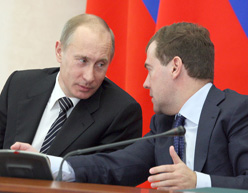Russian leadership tandem’s conflicting presidential ambitions put elite on edge

MOSCOW, Russia — After years of being vague on his 2012 presidential aspirations, Dmitry Medvedev, the incumbent Russian leader, moved a step closer to publicly declaring his reelection bid in an interview to a Chinese TV channel, saying a decision on this issue will be made shortly. “I can tell you that as the current head of state that I think about the election. It is my duty. I don’t rule out the possibility of seeking a second term.”
The president went on to list a number of political, economic and social factors that would define his decision to seek or not to seek a second term in the Kremlin. “This decision should take into account the prevailing social situation, current political environment and, most importantly, our citizens’ attitudes,” he added. “One has to weigh all the chances, avoid acting mechanically, and, instead, proceed with a clear understanding of the situation. I expect such understanding to form within a relatively short time.”
However, as the local and international communities were about to read this as a the long-awaited sign that a deal has been struck on this issue with all the relevant political forces in the country, Prime Minister Vladimir Putin dropped a political bombshell, saying that he also does not exclude the possibility of participating in the 2012 presidential race. “Neither me nor President Medvedev has ruled out the possibility of running for election in 2012. We intend to make a decision based on the real situation in the country closer to the elections. This decision will have to be made at some point later, as it is too early to so now.”
This later statement has again thrown the political guessing game about the real candidate for the 2012 election into complete disarray. Putin even sounded irritated by the election question that has been dodging the tandem leadership ever since the current political diarchy was set up in 2008. “If we make any erroneous indications now, half of Presidential administration and half of the Cabinet would stop working in anticipation of some changes. We cannot afford any disruptions."
In a ‘normal democracy,’ there is no speculation over whether an elected incumbent head of state that meets constitutional consecutive terms requirement could stand for a re-election. For instance, in the United States, the incumbent president, Barack Obama, does not expect any challenges from his party members for the Democratic Party’s nomination slot in the 2012 election. But the situation in Russia is a bit different as Medvedev, a former Putin protegee, became a president in 2008 because the Russian Constitution legally barred his predecessor from seeking a third consecutive presidential term in the Kremlin. But today, the situation has changed and the nation’s two most influential political heavyweights are now eligible for the presidential race, and hence could end up challenging each other at the 2012 vote.
This dual position has created palpable nervousness among the country’s ruling political elite, top ranking bureaucrats and leading business tycoons and high-profile culture celebrities, who are afraid of making ‘a fatal false start’ by backing the ‘wrong horse’ in 2012. “There is growing nervousness between the two camps supporting either of the diarchy leadership members. It is understood that one of these camps supports Putin, seen as a conservative candidate, while the other is for Medvedev, largely viewed as a more liberal politician,” Alexei Mukhin, head of the Center for Political Information, a think tank, said.
This nervousness was also probably responsible for the United Russia's reaction to the president’s 2012 declaration, with a key party member, State Duma First Deputy Speaker Oleg Morozov and a member of the Party's influential Supreme Council, saying the incumbent president could successfully seek a second term only if this is approved by Putin and run on the United Russia party’s platform. “Putin is our party leader. Therefore, if he says he will run for presidency, then he will be our candidate. If our party leader agrees that Medvedev will be the candidate, then United Russia is the country's only political force he can rely on.”
In a recent interview to NTV, Nikita Mikhalkov, an Oscar winning film director and a looming public figure in the country, said he would unequivocally support for Putin for the presidency, should he decide to a seek a return back to the Kremlin. “Putin’s job as prime minister has enabled him as no other to really feel the expansiveness of our country,” he added.
However, other less brave United Russia party apparatchiks, business elite and social celebrities who have something to lose in case of ‘wrong guessing’ the tandem’s real candidate for the 2012 election are sitting tight on the fence and watching how the guessing game will end before finally declaring their allegiance to the ‘chosen and approved candidate.’
Just as it happened in 2008, when the incumbent president and Sergei Ivanov, both first deputy prime ministers at the time, were the officially designated candidates for Putin’s replacement in the Kremlin. The elite, divided between the two candidates, sat put, watching the political satire play out, but as soon as Medvedev was officially chosen as the ‘heir designate,’ the elite’s support pendulum swung to his side, leaving Ivanov to wallow in mediocrity.
By Chris Kenneth












 Web design,
Web design,